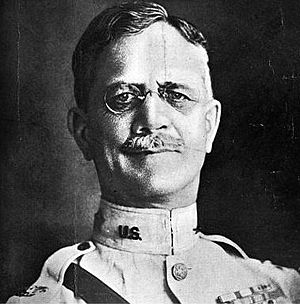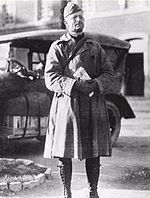Charles Dudley Rhodes facts for kids
Quick facts for kids
Charles Dudley Rhodes
|
|
|---|---|

Colonel Charles D. Rhodes, 1922
|
|
| Nickname(s) | Teddy |
| Born | February 10, 1865 Delaware, Ohio |
| Died | January 24, 1948 (aged 82) Washington, DC |
| Place of burial | |
| Allegiance | |
| Service/ |
|
| Years of service | 1889–1929 |
| Rank | |
| Commands held | Mounted Service School 79th Field Artillery Regiment 157th Artillery Brigade 42nd Infantry Division 34th Infantry Division |
| Battles/wars | Indian Wars China Relief Expedition Spanish–American War World War I |
| Awards | Distinguished Service Cross Distinguished Service Medal Silver Star Order of the Bath Legion of Honor |
| Other work | Author, lecturer |
Charles Dudley Rhodes (born February 10, 1865 – died January 24, 1948) was an important United States Army officer. He became a Major General. He was known for leading cavalry (soldiers on horseback) in many conflicts. These included the Indian Wars and World War I. He was also a writer and speaker.
Contents
Early Life and Education
Charles D. Rhodes was born in Delaware, Ohio, on February 10, 1865. His friends and family called him "Teddy." He went to Columbian University (now George Washington University) and finished in 1885.
In 1889, he graduated from the United States Military Academy at West Point. After that, he became a Second Lieutenant in the cavalry.
Early Military Career
Rhodes served in the 6th Cavalry Regiment. This was during the last big US Army campaign against the Sioux people.
After the Indian Wars, Rhodes had other jobs. He was a professor of military science at Ohio Wesleyan University. He also led a cavalry troop during the China Relief Expedition.
Spanish–American War Service
Rhodes served with the 6th Cavalry Regiment in the Philippines. This was during the Spanish–American War. He showed great bravery at Cavite on the island of Luzon. For his actions, he received the Distinguished Service Cross.
Between Major Wars
After the Spanish-American War, Rhodes continued his military education. He graduated from the Command and General Staff College in 1908.
In 1911, Rhodes helped with a military exercise. He acted as an umpire for the Massachusetts Volunteer Militia.
Later in 1911, Rhodes went on a secret mission to Mexico. He and Paul Y. Malone pretended to be journalists. Their goal was to find out if Francisco I. Madero could stay in power. This was if Madero won the 1912 election.
During military training in Connecticut in 1912, Rhodes was an assistant chief of staff.
In 1913, Rhodes worked at the Cavalry Camp of Instruction. This camp was at Fort Riley, Kansas. From 1914 to 1917, he was the leader of Fort Riley's Mounted Service School.
From June to December, Rhodes commanded the 21st Cavalry Regiment. This unit was later changed into the 79th Field Artillery Regiment.
World War I Contributions
During World War I, Charles Rhodes led the 157th Artillery Brigade.
Later, he took command of the 42nd "Rainbow" Infantry Division. He was temporarily promoted to Major General. Soon after taking command in late 1918, Rhodes was hurt in a plane crash. He then gave command to Douglas MacArthur so he could recover.
After World War I
Rhodes continued his studies at the United States Army War College in 1920.
After World War I, he commanded the 34th Infantry Division. He also became the Chief of Staff for US forces in the Philippines. He was promoted to permanent Brigadier General in 1925. In 1928, he became a Major General.
Awards and Honors
Rhodes received several important awards. These included the Distinguished Service Cross, the Distinguished Service Medal, and the Silver Star.
For his service in World War I, he also received honors from other countries. He got the Order of the Bath from Great Britain. He also received the Legion of Honor from France.
Career as an Author
Rhodes was also a talented writer and speaker. He wrote several books and many magazine articles. He also wrote historical works about cavalry in the Civil War.
Some of his books include:
- History of the Cavalry of the Army of the Potomac (1900)
- The Vicksburg Campaign (1908)
- Intimate Letters of a West Point Cadet: An Epic in Blank Verse of the Class of 1889, United States Military Academy (1935)
- Chief Joseph and the Nez Perces Campaign of 1877 (1937)
- Diary Notes of a Soldier (1940)
Starting in the 1890s, Rhodes also wrote many articles and short stories for magazines.
Retirement and Passing
Rhodes retired from the Army in 1929. He then lived in Washington, D.C.. He passed away at Walter Reed Hospital on January 24, 1948. He was buried with his wife, Mary Counselman, at Arlington National Cemetery.
 | Delilah Pierce |
 | Gordon Parks |
 | Augusta Savage |
 | Charles Ethan Porter |


